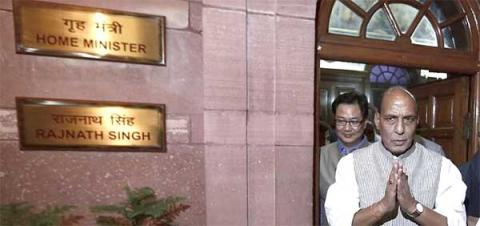Union Government has been issuing National Advisories through the Ministry of Home Affairs (MHA) to the States and Union Territories from time to time that are broadly designed to help strengthen institutional mechanism across the country to protect human rights of the people in order to end any type of coercive violation of their sacred rights and dignity in our system of rule of law based democratic governance. MHA is charged with ensuring well coordinated approach to Centre-States relations. Whether such advisories are implemented by the States and Union Territories, no one is aware of the matter in the Union Government. An inquiry in the MHA has revealed that there is no impact assessment of such advisories, which means there is no seriousness in the Government to enforce them and such matters are mere formalities that the Centre completes to befool the people. According to constitutional experts, moral responsibility of the Union of India does not end by mere circulation of the model legislation, prison manual or advisories. It is a sorry state of affairs that no notable steps are taken by the Government to ensure the implementation of the advisories.
So far, the MHA has issued 33 National Advisories to the States and Union Territories, as available in its portal. These cover all aspects of human rights including safety, security and socio-economic welfare of the people with attendant democratic norms. But what happens on the ground, human rights are violated with impunity by oppressive and repressive official machinery with no accountability. For example, police brutality during custody, one of the several forms of police misconduct that assumes grave proportions when perpetrated against the weaker and vulnerable sections of the society, continues unabated. One is perturbed at the growing instances of custodial excesses, (cases of rapes, death in custody), which compromises the basic rights of individual citizens. General absence of any attention of concerned authorities to the necessity of keeping temper, being civil and respectful to the public, avoiding brutality and harshness are the factors that lead to violence. Gore Committee on Police Training 1972 had recommended that police training should be to inculcate right attitude towards the public which consists in never forgetting that in our system of governance the civil servant is the servant and not the master of the community, continues to be violated with derision.
In yet another national advisory to register FIRs compulsorily at police stations, what happens on the ground is stark reality that unless one pays bribes to the SHOs or pulls strings of high connection, no FIRs can be lodged. Similarly, contrary to national advisory police continue to brief media against victims in sensitive cases helping trial by media and prejudicing the course of justice in the courts. In the process, lives of many innocents are ruined with no accountability of police when many innocent victims are let off by courts in the absence of credible evidence. Crimes against women and children continue to increase despite national advisory to the contrary. Similarly, targeted violence against Dalits and minorities continue to flourish with no remedy for the victims.
In view of the foregoing, it appears democracy in India is mere election-centric and sham. There is no rule of law based system of democratic governance. Unless the Union Government takes all possible measures to translate the philosophy of model law/model reforms/advisories as mandated in the national policy in action in a time bound approach, the Central Government working as nodal point is meaningless. Following growing claimer for protection of human rights, ensuring accountability and transparency under the Right to Information Act, 2005 (RTI Act, 2005) that provides window of opportunity for humane approach and implementation, the Central Government is expected to oversee implementation of model laws/model reforms and national advisories in the States and Union Territories.
It’s a sign of worry that the Centre do not conduct impact assessment of the implementation of such important matters that affect citizens’ right to life, personal liberty and overall welfare. Non-compliance of Model Prison Manual 2003, Model Prison Manual 2016 and National Advisories results in aberrations in the dispensation of justice to the people in distress!
-By M.Y.Siddiqui

